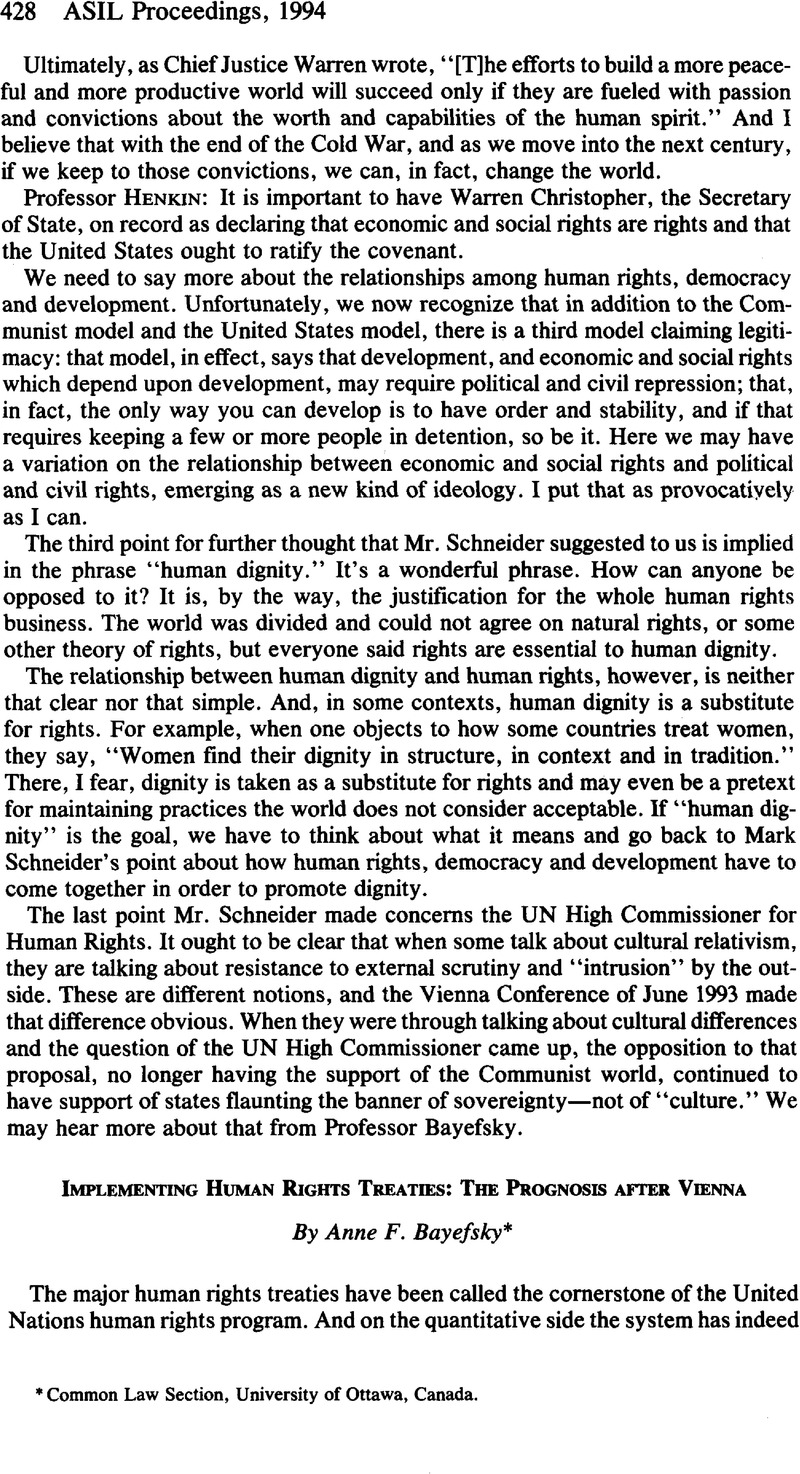No CrossRef data available.
Article contents
Implementing Human Rights Treaties: The Prognosis after Vienna
Published online by Cambridge University Press: 28 February 2017
Abstract

- Type
- An International Human Rights Agenda for the End of the Century: New Human Rights?
- Information
- Copyright
- Copyright © American Society of International Law 1994
References
1 References to human rights treaties in this paper are only to the following: The Convention on the Elimination of All Forms of Racial Discrimination; The Covenant on Civil and Political Rights; The Covenant on Economic, Social and Cultural Rights; The Convention on the Elimination of DiscriminationAgainst Women; The Convention Against Torture; and The Convention on the Rights of the Child.
2 Statistics are generally current to February 1994.
3 This figure averages the amount of time spent on the consideration of initial and subsequent reports.
3 Preliminary figures from the early operation of the Child Committee have been excluded.
5 CERD/C/SR.932, 21 August 1991, ¶ 27.
6 Rosalyn Higgins, 52 MOD. L. REV. 1, 20 (1989).
7 See, e.g., CERD concluding observations on Mozambique, CERD/C/SR.983, 25 March 1993, at 10 (rejecting the language proposed by Ferrero Costa); on Jamaica, CERD/C/SR.983, at 9; and on Chad, CERD/C/SR.983, at 10.
8 Even once a state submits a report to the Women’s Committee, it will be considered only if the state then indicates its willingness to send representatives when the report is to be considered. There have been situations where states have repeatedly refused to send representatives; Romania and Peru delayed the consideration of their reports in this manner.
9 Libya was the state party.
10 A/48/40 (Part I), 7 October 1993, at 30, ¶ 112. Such vagueness in the context of the Committee comments in puzzling, in view of the comments of individual members who were able to specify particular areas of concern. For example, they expressed concern over the provisions of the Family Code that established the husband as sole head of the household and the continuing practice of polygamy. A/48/40 (Part I), 7 October 1993, 28,¶ 105.
11 At the same time, in the case of China and Libya, when the information provided was insufficient the Committee requested an additional report and did have the state representatives return to discuss the new reports.
12 A/48/40 (Part I), 7 October 1993, at 225, ¶ 16.
13 A/48/40 (Part I), 7 October 1993, at 217. It has also made special appeals for overdue reports to be submitted from Haiti, El Salvador, Sudan and Zaire. A/48/40 (Part I), 7 October 1993, at 215-16.
14 CRC/C/10, 19 October 1992, at 18, 19,1 55.
15 It had sought specific information on ethnic conflicts in the case of Rwanda and Burundi (A/47/18, 22 September 1992, at 77, Decisions 1 (XXXI) and 2 (XXXI). It sought further information from states of the former Yugoslavia (A/48/18, 15 September 1993, at 113, Decision 1 (42). In the case of the states of the former Yugoslavia, Committee members visited the region in December 1993 in their “good offices” capacity. In different circumstances, folowing their consideration of the report submitted by Nigeria (the first report received in five years) the Committee requested further information (A/48/18,15 September 1993, at 69,11329). Again in different circumstances, following the consideration of the situation of Papua Guinea in the absence of a state report, since the state had not submitted a report in 10 years, the Committee requested additional information (A/47/18, 22 September 1992, at 68,1 266).
16 Committee on the Elimination of Racial Discrimination, Forty-fourth session, 28 February-18 March 1994 (emphasis added).
17 It was the first time the Racial Committee perceived a sufficient pattern of racial discrimination to warrant an urgent report in any state in the Middle East. In 1977, one-and-a-half years after the General Assembly equated Zionism with racism, the Racial Committee took a decision expressing its grave concern about Israeli occupation of the Golan Heights and its effect on racial discrimination. It asked the General Assembly to take certain action. Decision I (XV), 1 April 1977, at 92, A/32/18.
18 The decision should also be placed in the context of the attitude toward Israel demonstrated previously by the Committee. For example, in the case of the report of Syria, the Committee adopted general conclusions that begin: “The Committee noted its appreciation of Syria’s maintenance of dialogue with the Committee” (CERD/S/CSR.914-37, 3 November 1992, p. 244, ¶ 33). In the case of the report of the Sudan, the Committee adopted concluding observations that begin: “The Committee expressed appreciation for the willingness of the Government of the Sudan to continue its dialogue with the Committee” (A/48/18, 15 September 1993, p. 39, ¶ 124). While the Committee was drafting the concluding observations on the Israeli report, however, Chairman Shahi (Pakistan) said: “The Chairman, speaking in his personal capacity, noted that the draft began by stating that the Committee expressed its appreciation for its continuing dialogue with the Government of Israel. He was not sure whether the Committee expressed its appreciation for its continuing dialogue with other countries. He suggested further consultations should be held.…” (CERD/C.SR.914-37, 3 November 1992, p. 278, ¶ 3); following this statement the language was removed from the Committee’s conclusions.
19 GA Res. 45/155.
20 GA Res. 47/122, 18 December 1992.
21 A/CONF. 157/23, p. 27, ¶ 92
22 A/CONF.157/PC/L.32, 30 April 1993.
23 A/CONF. 157/23, p. 27, ¶ 89.




